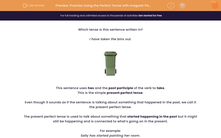Which tense is this sentence written in?
I have taken the bins out.

This sentence uses has and the past participle of the verb to take.
This is the simple present perfect tense.
Even though it sounds as if the sentence is talking about something that happened in the past, we call it the present perfect tense.
The present perfect tense is used to talk about something that started happening in the past but it might still be happening and is connected to what’s going on in the present.
For example:
Sally has started painting her room.

This sentence shows that Sally started painting her room in the past, but she might still be painting it now.
To write in the present perfect tense we must use the present tense of the verb to have - either have/has, + a past participle.
A past participle is usually a past tense verb ending in -ed (like walked) or -en (like eaten).
We use 'have' after the words I, you, we and they.
I have eaten
You have eaten
We have eaten
They have eaten
We use 'has' after the words she, he and it.
She has eaten
He has eaten
It has eaten
This sentence is in the present tense:
He goes to the zoo.

What would this sentence be in the present perfect tense?
He has gone to the zoo.
Gone is the past participle of goes.
Gone is an irregular past participle.
We are used to past participles ending in -en (like given) and -ed (like jumped) but there are quite a few irregular past participles.
Here are some examples:
| Present | Irregular Past Participle |
| begin | begun |
| build | built |
| drink | drunk |
| forget | forgotten |
| get | got |
| lose | lost |
| put | put |
| spend | spent |
| think | thought |
This sentence is in the present tense:
He thinks of her every day.
What would this sentence be in the present perfect tense?
Use the table of irregular past participles to help you here.
He has thought of her every day.
In this activity, you’ll be using irregular past participles to help you write in the present perfect tense.







